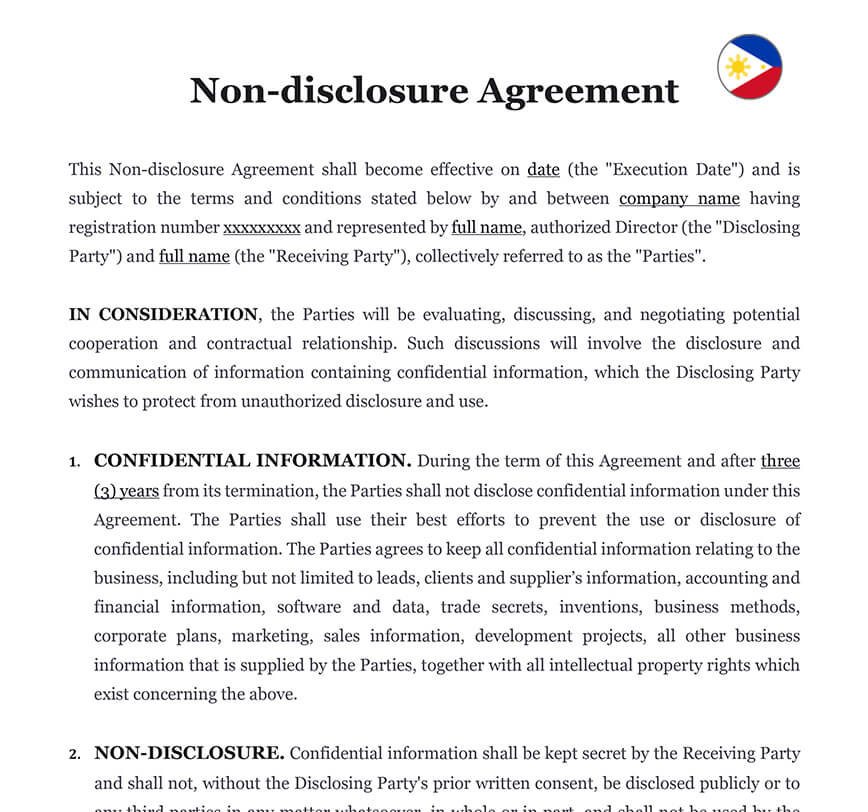Why are NDAs important for small businesses in the Philippines?
Non-Disclosure Agreements (NDAs) are crucial for small businesses in the Philippines for several reasons. Firstly, NDAs help protect sensitive and confidential information shared with employees, contractors, partners, or investors. Small businesses often possess valuable trade secrets, business strategies, customer data, or proprietary technologies that give them a competitive edge. NDAs ensure that such information remains confidential and prevents unauthorized disclosure.
Additionally, NDAs foster trust and build stronger business relationships. When small businesses engage in collaborations, partnerships, or joint ventures, sharing confidential information is often necessary. By having NDAs in place, small businesses can establish a legally binding agreement that ensures the recipient will keep the information confidential. This gives small businesses the confidence to share sensitive data without the fear of it being misused or shared with competitors.
What is the significance of Non-Disclosure Agreements (NDAs) for small businesses?
Non-Disclosure Agreements hold significant importance for small businesses in the Philippines. NDAs provide legal protection by outlining the terms and conditions regarding the confidentiality of sensitive information. These agreements clearly define what information is considered confidential, who has access to it, and the obligations of the parties involved.
The significance of NDAs lies in their ability to safeguard a small business’s intellectual property, trade secrets, client lists, marketing strategies, and other confidential information. This protection is crucial in maintaining a competitive advantage, securing investments, and preserving the business’s reputation.
Moreover, NDAs contribute to maintaining trust and professionalism in business relationships. By having a formal agreement in place, small businesses can establish clear boundaries and expectations regarding the use and disclosure of confidential information. This not only protects the business’s interests but also helps establish a favorable reputation for respecting confidentiality, which can attract potential partners, investors, and clients.
What are the key benefits of implementing NDAs for small businesses in the Philippines?
Implementing Non-Disclosure Agreements (NDAs) offers several key benefits for small businesses in the Philippines.
Firstly, NDAs provide legal protection and enforceability. By defining the terms and conditions of confidentiality, NDAs create a binding agreement that can be enforced through legal means in case of a breach. This enables small businesses to take legal action and seek remedies if their confidential information is unlawfully disclosed or misused.
Secondly, Non-Disclosure Agreements establish a sense of trust and confidence. When small businesses share confidential information with employees, contractors, or partners, having an NDA in place demonstrates the seriousness and commitment to protecting sensitive data. This helps foster stronger relationships and encourages parties to share valuable information, leading to potential collaborations and business growth.
Furthermore, NDAs preserve a small business’s competitive advantage. By keeping trade secrets, proprietary technology, or marketing strategies confidential, NDAs prevent competitors from gaining access to valuable information that could be used to replicate or undermine the business’s success. This protection helps maintain a unique position in the market and safeguards the business’s intellectual property rights.
Lastly, NDAs provide peace of mind and reduce the risk of disputes. By clearly outlining the obligations and responsibilities of each party regarding confidentiality, NDAs minimize misunderstandings and conflicts. Should any issues arise, the NDA serves as a reference point for resolving disputes and ensuring that the parties fulfill their obligations.
How do NDAs help protect intellectual property for small businesses?
1. Confidentiality
Non-Disclosure Agreements establish a confidential relationship between the disclosing party (the small business) and the recipient (employees, contractors, partners, etc.). By explicitly defining what constitutes confidential information, NDAs ensure that sensitive data remains protected from unauthorized disclosure or use.
2. Trade Secrets
NDAs can specifically address the protection of trade secrets, which are valuable proprietary information that gives a small business a competitive advantage. The agreement outlines the recipient’s obligation to maintain the confidentiality of trade secrets, preventing them from sharing or using the information for their benefit or the benefit of competitors.
3. Inventions and Innovations
NDAs can cover inventions, discoveries, or new technologies developed by the small business. By requiring the recipient to keep such information confidential, NDAs safeguard the business’s ownership rights and prevent others from stealing or replicating these valuable innovations.
4. Restricted Use
NDAs can include provisions that limit the recipient’s use of confidential information to a specific purpose or project. This prevents the misuse or unauthorized application of the small business’s intellectual property beyond what is agreed upon.
5. Non-Competition
In some cases, NDAs may contain non-competition clauses that restrict the recipient’s ability to engage in similar business activities that could compete with the disclosing party. This helps protect the small business’s market position and prevents the recipient from leveraging the confidential information to establish a competing enterprise.
What are the common misconceptions about NDAs for small businesses?
There are several common misconceptions about Non-Disclosure Agreements (NDAs) for small businesses. Understanding these misconceptions is essential for small business owners in the Philippines to make informed decisions. Here are a few misconceptions to be aware of:
1. NDAs are only for big businesses: Some small business owners believe that NDAs are only necessary for larger corporations. However, small businesses also handle valuable information that needs protection, such as customer data, trade secrets, and business strategies. NDAs are equally important for small businesses to safeguard their interests and maintain a competitive edge.
2. NDAs are complex and costly: Another misconception is that NDAs are overly complex and expensive. While it is advisable to have legal professionals draft or review NDAs to ensure they are comprehensive and enforceable, this doesn’t necessarily mean they have to be complicated or costly. Templates and standardized agreements can be used as a starting point and tailored to suit the specific needs of small businesses.
3. Verbal agreements are sufficient: Some small business owners believe that verbal agreements or handshake deals provide enough protection. While oral agreements may have some legal validity, they are challenging to enforce and prove in case of a dispute. Having a written NDA offers clear terms and provides stronger legal protection for small businesses.
4. One-size-fits-all NDAs: Small business owners may assume that a generic NDA found online will suffice for their needs. However, each business has unique circumstances, and using a generic NDA may not adequately address specific concerns or protect the business’s interests. It is important to tailor the NDA to the specific requirements and consult with legal professionals if necessary.
5. NDAs are unnecessary with trustworthy individuals: Trusting someone doesn’t eliminate the need for an NDA. Even with trustworthy employees, contractors, or partners, Non-Disclosure Agreements provide a legal framework for protecting confidential information. It sets clear expectations and ensures that all parties understand their responsibilities regarding confidentiality.

What are the legal implications of enforcing NDAs for small businesses in the Philippines?
Enforcing Non-Disclosure Agreements (NDAs) in the Philippines carries significant legal implications for small businesses. Breach consequences, burden of proof, confidentiality remedies, civil and criminal liability, jurisdiction, governing law, and confidentiality periods are vital factors to consider. Seek legal guidance to ensure enforceability and proper protection of confidential information.
Ask our Experts to draft a contract tailored to your needs
310 client reviews (4.8/5) ⭐⭐⭐⭐⭐











